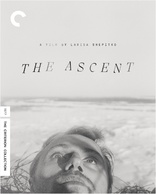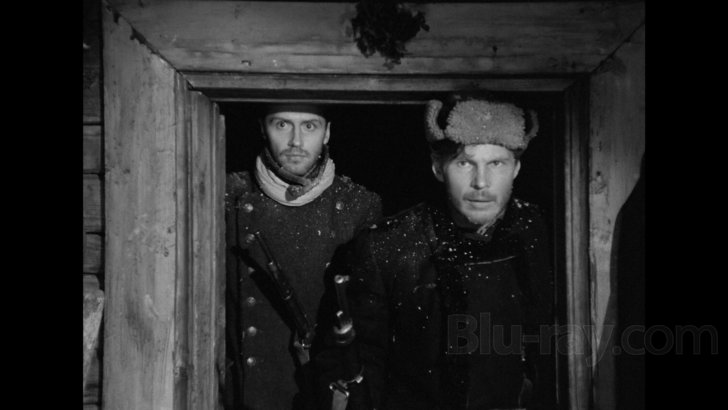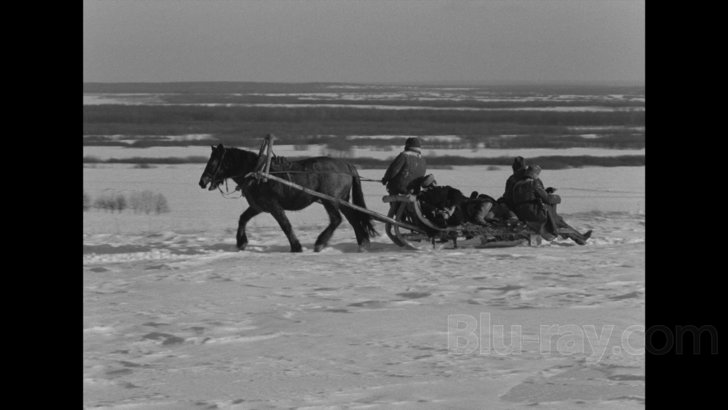The Ascent Blu-ray Movie
HomeThe Ascent Blu-ray Movie 
Восхождение / VoskhozhdenieCriterion | 1977 | 109 min | Not rated | Jan 26, 2021

Movie rating
8.1 | / 10 |
Blu-ray rating
| Users | 0.0 | |
| Reviewer | 4.0 | |
| Overall | 4.0 |
Overview
The Ascent (1977)
Two Soviet partisans depart their starving band on a short march to a nearby farm to get supplies. The Germans have reached the farm first, so the pair must go on a journey deep into occupied territory, a voyage that will also take them deep into their souls.
Starring: Boris Plotnikov, Vladimir Gostyukhin, Anatoliy Solonitsyn, Sergey Yakovlev, Lyudmila PolyakovaDirector: Larisa Shepitko
| Foreign | Uncertain |
| Drama | Uncertain |
| Psychological thriller | Uncertain |
| War | Uncertain |
| Thriller | Uncertain |
Specifications
Video
Video codec: MPEG-4 AVC
Video resolution: 1080p
Aspect ratio: 1.37:1
Original aspect ratio: 1.37:1
Audio
Russian: LPCM Mono (48kHz, 24-bit)
Subtitles
English
Discs
Blu-ray Disc
Single disc (1 BD)
Playback
Region A (locked)
Review
Rating summary
| Movie | 4.0 | |
| Video | 4.5 | |
| Audio | 5.0 | |
| Extras | 4.5 | |
| Overall | 4.0 |
The Ascent Blu-ray Movie Review
Reviewed by Dr. Svet Atanasov January 28, 2021Larisa Shepitko's "The Ascent" (1977) arrives on Blu-ray courtesy of Criterion. The supplemental features on the disc include new introduction by Anton Klimov; new video interview with actress Lyudmila Polyakova; archival Russian television programs; short film; and more. In Russian, with optional English subtitles for the main feature. Region-A "locked".

In the West, there were always plenty of people willing to praise Larisa Shepitko’s film because they saw it from a very particular angle, and seen from there, it made perfect sense to them. They usually praised the power of its visuals as well as the dual, thought-provoking nature of its narrative.
It the former Soviet Union and the rest of the satellite states it took some time for ordinary people to see Shepitko’s film, and when they finally did, they had a very different experience with it because they recognized plenty that was not of any significance to the people in the West. For example, everyone knew that the film was a ‘survivor’ that miraculously overcame an almost certain death after it was endorsed by Pyotr Masherov, the leader of the Communist Party in Soviet Belorussia (now Belarus). Without the endorsement, Shepitko’s film would have suffered the same fate hundreds of thousands of other nonconforming films did after the end of WW2. So, there was a general consensus that the message of the film had won, but a lot of people also recognized the great irony that emerged from its success and how in many ways it actually worked against it.
The events in the film take place during a brutal winter in a remote corner of Belarus sometime after Hitler’s armies have arrived. Different groups of partisans have started clashing with the invaders, but it is an uneven fight because they have been forced to hide in the forest and survive without supplies and proper clothing. In the nearby villages anyone suspected of helping the partisans is immediately arrested, interrogated, and then promptly executed.
After barely surviving an intense shootout with a small platoon of invaders, partisans Sotnikov (Boris Plotnikov) and Rybak (Vladimir Gostyukhin) are tasked by their commander to look for food in an area they supposedly know well. The two begin making their way through the vast frozen fields that used to feed the local farmers and eventually find what they are looking for, but on the way back are forced to seek shelter in a remote home where Demchikha (Lyudmila Polyakova), a single mother, reluctantly agrees to help them after she realizes that Sotnikov is seriously ill and injured. Soon after, the partisans are discovered by patrolmen and arrested. Demchikha is accused of being a ‘collaborator’ and taken into custody as well.
Portnov (Anatoli Solonitsyn), a former teacher who has switched sides and started working for the secret police, begins interrogating Sotnikov and Rybak, hoping that they would reveal the location of their group as well as the trusted contacts they have in the area. Despite being brutally tortured, Sotnikov refuses to speak, but Rybak abandons his principles and agrees to become a puppet for the invaders. On the day when Sotnikov and a couple of other 'collaborators’ are to be executed, however, Rybak undergoes a maddening transformation.
Like virtually all good nonconforming Soviet films, The Ascent is structured to function as a chameleon that does different things at once. This is the reason why by the time Sotnikov and Rybak are transferred to the police station the focus of attention is already firmly on the clash of beliefs that would determine their fate and the religious context they are placed in. There is very heavy symbolism here that is impossible to miss. (The traditionally brainless Soviet censors at Gosfilm did not miss it either, which is why prior to Masherov’s endorsement a lot of people had already concluded that the film will never see the light of day). The reason why the symbolism was problematic was the Party’s official stance on religion, and Christianity in particular -- everything that had anything to do with it and was part of Russian identity during the pre-Revolution times was outlawed and, in the process, hundreds of thousands of Russian Orthodox bishops were executed. So, to have Sotnikov, a communist, using his Christian faith to reject the invaders was, to put it mildly, a very serious issue.
But there was something even more serious, even dangerous, that occurred after the film was legitimized by Masherov. It was the mass realization that there was a great irony in having a covertly ‘religious’ film promoting communist heroism, which instantly made the people that did the promotion look a lot like Rybak.
*The film is based on Vasiliy Bykov's novella. However, there are significant discrepancies between the two, especially in the manner in which the personal struggles of the main characters are depicted. The religious symbolism isn't a key theme in the novella.
The Ascent Blu-ray Movie, Video Quality 

Presented in its original aspect ratio of 1.37:1, encoded with MPEG-4 AVC and granted a 1080p transfer, The Ascent arrives on Blu-ray courtesy of Criterion.
The following text appears inside the leaflet that is provided with this Blu-ray release:
"This new digital transfer was created in 4K resolution from the 35mm original camera negative and restored by Mosfilm. The original monaural soundtrack was remastered from the 35mm magnetic track.
Restored by: Victor Tamazin, D. Kolomeytseva, Aleksey Senkovsky, Evgeny Verlochev.
Restoration producer: Karen Shakhnazarov."
There is only one short segment early into the film where I noticed a very odd effect that looks like conventional sharpening but isn't. I am unsure what might have caused this anomaly because it is not replicated anywhere else in the film, but my guess is that it is related to an exacerbation
of a source issue that causes the harsher edges to appear as they currently are. (You can see examples in screencaptures #18 and 19). The rest looks great. I did some direct comparisons with my DVD release of The Ascent from the Eclipse Series 11: Larisa Shepitko DVD set and I can confirm that the upgrade in quality is significant. Delineation and depth are so much better that on a larger screen at times it almost looks like the DVD release lacks 80-90 percent of the resolution that is needed to recognize basic details. This makes a huge difference during the snowy footage where fine nuances are actually quite limited. The grading job is very nice. The blacks are solid but natural and the grays and whites appear very nicely balanced. There are no stability issues. The entire film looks spotless as well. (Note: This is a Region-A "locked" Blu-ray release. Therefore, you must have a native Region-A or Region-Free player in order to access its content).
The Ascent Blu-ray Movie, Audio Quality 

There is only one standard audio track on this Blu-ray release: Russian: LPCM Mono (48kHz, 24-bit). Optional English subtitles are provided for the main feature.
Alfred Schnittke's soundtrack has an important role, but does not produce a great deal of dynamic movement. The key contrasts that shape up the film's ambience emerge from the careful use of nuances that blend music and different nature sounds. The dialog is very clear, clean, and easy to follow. There are no audio dropouts, background hiss, or other similar age-related anomalies to report.
The Ascent Blu-ray Movie, Special Features and Extras 

- Introduction - in this new video program, Anton Klimov, son of Larisa Shepitko, discusses his mother's legacy, working methods, and the environment in which she completed The Ascent. The program was produced for Criterion in September 2020. In Russian, with optional English subtitles. (18 min, 1080p).
- Selected-Scene Commentary - in this new program, critic Daniel Bird highlights some of the key differences between The Ascent and Vasiliy Bykov's novella, and discusses the role of Alfred Schnittke's soundtrack.
1. Without compromise
2. The problem of choice
3. The material world
4. The sleigh ride
5. The grad inquisitor
6. The tomb
7. The ascent
8. Rybak
- Lyudmila Polyakova - in this new video interview, Lyudmila Polyakova discusses her contribution to The Ascent and explains how her professional relationship with Larisa Shepitko impacted her career. Also, there are some very interesting observations about her work and relationship with Elem Klimov. The interview was conducted for Criterion in Moscow in October 2020. In Russian, with optional English subtitles. (23 min, 1080p).
- The Homeland of Electricity - Larisa Shepitko directed this short film as part of a 1967 omnibus film entitled Beginning of an Unknown Era, commission to honor the fiftieth anniversary of the October Revolution. The communists deemed the depiction of the early Bolsheviks in the film too critical, and it was shelved upon completion. With the help of Elem Klimov, the film was finally screened in 1987. In Russian, with optional English subtitles. (39 min, 1080p).
- Larisa - Elem Klimov made this short documentary a year after the death of his wife, Larisa Shepitko, in 1979. In Russian, with optional English subtitles. (21 min, 1080p).
- A Talk with Larisa - presented here is an archival program from the Russian television channel Kultura with an introduction by Elem Klimov and critic Irina Rubanova to an interview with Larisa Shepitko that was recorded after the 1978 Berlin International Film Festival. The program was produced in 1999. In Russian, with optional English subtitles. (53 min, 1080i).
- Islands - this archival program focuses on the life and legacy of Larisa Shepitko. It features interviews with the director's son, Anton Klimov, her sister, Emilia Tutina, screenwriter Natalia Riasentseva, and director Rolan Sergienko, amongst others. The program was broadcast on the Russian television channel Kultura in 2012. In Russian, with optional English subtitles. (40 min, 1080i).
- More Than Love - this archival program examines the relationship between Larisa Shepitko and her husband, Elem Klimov. The program was broadcast on the Russian television channel Kultura in 2012. In Russian, with optional English subtitles. (40 min, 1080i).
- Leaflet - an illustrated leaflet featuring an essay by critic Fanny Howe and technical credits.
The Ascent Blu-ray Movie, Overall Score and Recommendation 

I think that very few people in the West can truly grasp how dangerous the religious symbolism in The Ascent was when Larisa Shepitko completed it. The film's take on heroism contradicts what was the Party's official stance on religion -- which targeted primarily Christianity and its relationship with Russian identity during the pre-Revolution times -- and does it in a way that is essentially impossible to miss or ignore. Directing such a film was a huge risk, one that could end more than just a prolific career. There was a great irony that emerged from the film's success as well, which made it even more controversial, or at least in the eyes of those that could recognize the similarities between one of its key characters and the people that once thought that it was unacceptable but later on ended up promoting it with unbridled enthusiasm. I like the film a lot and have always had a copy of it in my library, but I tend to disagree with the popular opinion that it is a flawless masterpiece. As implied above, it is very much a product of its time, which admittedly is the main reason why it remains so intriguing. Criterion's release is sourced from a very solid recent 4K master which was prepared after the film was restored at Mosfilm, in Russia. HIGHLY RECOMMENDED.
Similar titles
Similar titles you might also like

Come and See
Иди и смотри / Idi i smotri
1985

In the Fog
V tumane
2012

The Painted Bird
Nabarvené ptáce / Slipcover in Original Pressing
2019

Ivan's Childhood
Ива́ново де́тство / Ivanovo detstvo
1962

The Cranes Are Flying
Летят журавли / Letyat zhuravli
1957

Lore
2012

Monos
2019

Black Book
Zwartboek
2006

Au revoir les enfants
1987

Army of Shadows
L'armée des ombres / Better encode than 2011 release
1969

Germany Year Zero
Germania anno zero
1948

Ashes and Diamonds
Popiól i diament
1958

Phoenix
2014

Rome, Open City
Roma cittŕ aperta
1945

Son of Saul
Saul fia
2015

La Grande Illusion
Grand Illusion
1937

The Confession
L'aveu
1970

A Man Escaped
Un condamné ŕ mort s'est échappé
1956

Salň, or the 120 Days of Sodom
Salň o le 120 giornate di Sodoma
1975

Europa Europa
1990